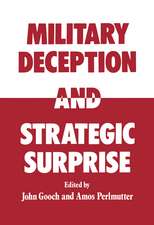The Universal Adversary: Security, Capital and 'The Enemies of All Mankind'
Autor Mark Neocleousen Limba Engleză Paperback – 25 feb 2016
The history of bourgeois modernity is a history of the Enemy. This book is a radical exploration of an Enemy that has recently emerged from within security documents released by the US security state: the Universal Adversary. The Universal Adversary is now central to emergency planning in general and, more specifically, to security preparations for future attacks. But an attack from who, or what? This book the first to appear on the topic shows how the concept of the Universal Adversary draws on several key figures in the history of ideas, said to pose a threat to state power and capital accumulation. Within the Universal Adversary there lies the problem not just of the terrorist but, more generally, of the subversive, and what the emergency planning documents refer to as the disgruntled worker . This reference reveals the conjoined power of the contemporary mobilisation of security and the defence of capital. But it also reveals much more. Taking the figure of the disgruntled worker as its starting point, the book introduces some of this worker s close cousins figures often regarded not simply as a threat to security and capital but as nothing less than the Enemy of all Mankind: the Zombie, the Devil and the Pirate. In situating these figures of enmity within debates about security and capital, the book engages an extraordinary variety of issues that now comprise a contemporary politics of security. From crowd control to contagion, from the witch-hunt to the apocalypse, from pigs to intellectual property, this book provides a compelling analysis of the ways in which security and capital are organized against nothing less than the Enemies of all Mankind ."
| Toate formatele și edițiile | Preț | Express |
|---|---|---|
| Paperback (1) | 363.00 lei 6-8 săpt. | |
| Taylor & Francis – 25 feb 2016 | 363.00 lei 6-8 săpt. | |
| Hardback (1) | 996.33 lei 6-8 săpt. | |
| Taylor & Francis – 25 feb 2016 | 996.33 lei 6-8 săpt. |
Preț: 363.00 lei
Nou
69.47€ • 75.43$ • 58.35£
Carte tipărită la comandă
Livrare economică 23 aprilie-07 mai
Specificații
ISBN-10: 1138955167
Pagini: 190
Ilustrații: 14 black & white illustrations
Dimensiuni: 156 x 234 x 13 mm
Greutate: 0.29 kg
Ediția:1
Editura: Taylor & Francis
Colecția Routledge
Locul publicării:Oxford, United Kingdom
Public țintă
Postgraduate and UndergraduateCuprins
Descriere
The history of bourgeois modernity is a history of the Enemy. This book is a radical exploration of an Enemy that has recently emerged from within security documents released by the US security state: the Universal Adversary. The Universal Adversary is now central to emergency planning in general and, more specifically, to security preparations for future attacks. But an attack from who, or what? This book the first to appear on the topic shows how the concept of the Universal Adversary draws on several key figures in the history of ideas, said to pose a threat to state power and capital accumulation. Within the Universal Adversary there lies the problem not just of the terrorist but, more generally, of the subversive, and what the emergency planning documents refer to as the disgruntled worker . This reference reveals the conjoined power of the contemporary mobilisation of security and the defence of capital. But it also reveals much more. Taking the figure of the disgruntled worker as its starting point, the book introduces some of this worker s close cousins figures often regarded not simply as a threat to security and capital but as nothing less than the Enemy of all Mankind: the Zombie, the Devil and the Pirate. In situating these figures of enmity within debates about security and capital, the book engages an extraordinary variety of issues that now comprise a contemporary politics of security. From crowd control to contagion, from the witch-hunt to the apocalypse, from pigs to intellectual property, this book provides a compelling analysis of the ways in which security and capital are organized against nothing less than the Enemies of all Mankind ."























